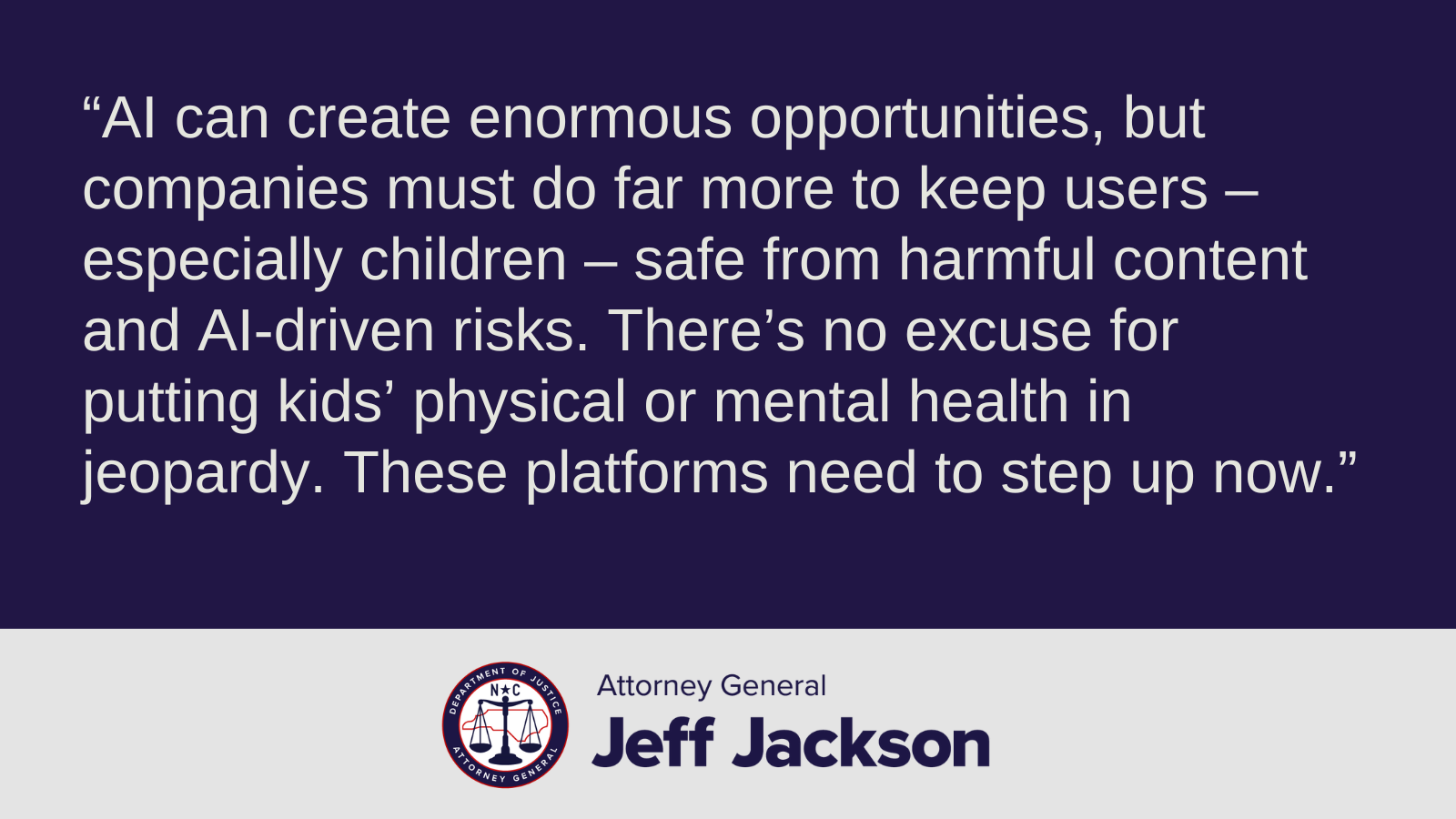
FOR IMMEDIATE RELEASE
Tuesday, August 26, 2025
Email: nahmed@ncdoj.gov
Phone: 919-538-2809
RALEIGH – Attorney General Jeff Jackson took two actions this week to protect children from deepfake pornography and AI chatbots that engage in inappropriate conduct with underage users. Protecting children online is a major priority for Attorney General Jackson.
On Monday, Attorney General Jackson co-led a bipartisan group of 44 attorneys general demanding that Apple, Microsoft, Meta, and AI tech companies protect children from predatory artificial intelligence products. Today, he joined a bipartisan group of 47 attorneys general writing to search engines, major banks and payment platforms demanding that they take stronger steps to prevent people from profiting from creating, sharing and selling deepfake nonconsensual intimate imagery.
“AI can create enormous opportunities, but companies must do far more to keep users – especially children – safe from harmful content and AI-driven risks,” said Attorney General Jeff Jackson. “There’s no excuse for putting kids’ physical or mental health in jeopardy. These platforms need to step up now.”
In their communications with Apple, Microsoft, and major AI platforms, the attorneys general raise concerns about recent revelations that Meta’s AI policies allow its AI assistants to “engage a child in conversations that are romantic or sensual.” The attorneys general are urging tech companies with public AI tools to review and revise their policies to protect children and prioritize their well-being.
In a letter to search engines, Attorney General Jackson outlined the failures of these companies to limit the creation of deepfakes and called for stronger safeguards – such as displaying warnings and redirecting users away from harmful content – to better protect the public. In a separate letter to payment platforms, the coalition urged these companies to take bolder actions to protect the public by identifying and removing payment authorization for deepfake content. Criminals may create and use this content to blackmail and coerce victims into paying them or creating more content. Research indicates that 98 percent of deepfake video content online is deepfake pornography. The attorneys general warn the companies that they must be more aggressive in identifying and removing buyers and sellers who are distributing, purchasing, or providing the tools to create these deepfakes.
This week’s actions come after Attorney General Jackson and 37 bipartisan attorneys general demanded last week that Instagram make immediate changes to its location-sharing feature to protect children from predators. Additionally, as part of the North Carolina Department of Justice’s ongoing lawsuit against TikTok, a judge on Thursday unsealed video of TikTok employees acknowledging that the app is designed to be addictive to minors at the expense of their health.
As children go back to school this week, it’s important for families to take steps to keep kids safe online. Here are some steps parents and caregivers can take:
- Review privacy settings and set up parental controls for accounts that your child uses. Consider email, social media apps, payment platforms, games, search engines, and your home WiFi network. You can filter or block content as appropriate for your child. Understand that these tools are limited and often difficult to use, and there is no substitute for limiting your child’s screen time. Visit the American Academy of Pediatrics’ Center of Excellence on Social Media and Youth Mental Health for more.
- Talk with your child about the existence of deepfake pornography, and how it can be used to harm and extort victims. Remind them that a lot of what they see online isn’t real, and they should be skeptical about what they see. Click here for more resources.
- Remind children to be careful of what information they share online – whether it’s with a friend, a stranger, or an AI tool. Anything you share online will likely always exist in some form.
- Keep an eye on your child’s behavior. Watch for changes that indicate that they may be experiencing challenges, and have conversations about those changes.
- If you become aware of deepfake pornography involving a minor, report it immediately to local law enforcement, the FBI, and the CyberTipLine.
###
